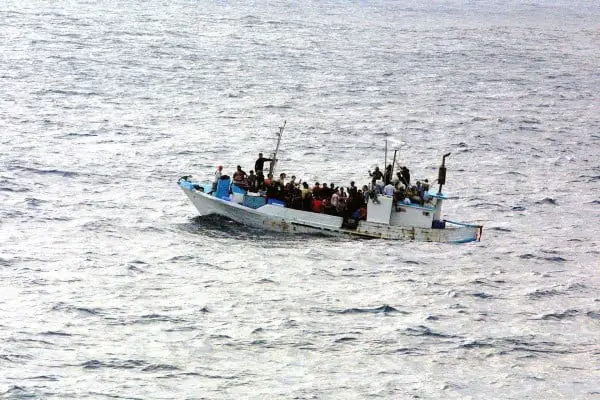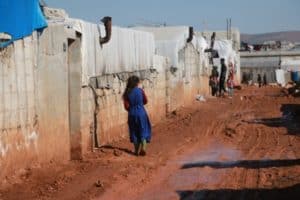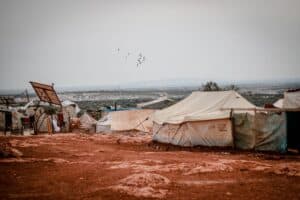This page contains affiliate links. This means if you a follow a link and make a purchase, at no additional cost to you, Humanitarian Careers will receive a commission. Thank you for supporting the site.
Working to help refugees can be highly rewarding career. As disasters, conflicts and crises create millions of refugees, more jobs are required to assist displaced people. From NGOs working on the front-line of humanitarian crises, to community groups working in local towns to help newly settled refugees, there are a wide range of organisations and jobs that work directly helping refugees.
If you are interested in a career working to assist people affected by conflict and displacement, we’ve put together the full guide to make that happen.
Why Do You Want to Work with Refugees?
When starting out on a career path wanting to help refugees, it’s important to make a few considerations at the beginning. The first should be, why do you want to help refugees? Working with refugees can be challenging and sometimes traumatic – you are directly assisting people who may have been through some extreme experiences.
However, working to help refugees is also an incredibly fulfilling and compassionate line of work. It is possible to make some amazing human connections.
Understanding why you want to work helping refugees is important because it will be your driving passion and motivator. NGO and charity work in general can be a difficult line of work to get into and sometimes a tough industry to navigate. Knowing why you want to work with refugees is vital as you go through the steps outlined below to begin your career.
Once you have thought hard about why you want to work helping refugees, it’s important to think about how. What skills do you have that can assist people who have been displaced? What characteristics do you have that you can offer to help other people often at times of extreme vulnerability?
You may not know your skills yet, but thinking about what you are good at and might be able to offer can help direct you as you move into a career working with refugees.
Going to University – What to Study for Refugee Work?
If you want a job helping refugees, you generally need a university degree. Many jobs in the charity sector require at least an undergraduate degree and many ask for a masters as well. If you want a career in the charity sector working with refugees, you are generally best to pick university courses related to refugees and migration.
However, if you have studied other subjects, don’t worry, it’s always possible to transition your career across to jobs working to help refugees.
Bachelors
When choosing a bachelors for a career working with refugees there are many options. Some universities offer specific undergraduate degrees in refugees and migration studies and if you know you definitely want a job helping refugees, these would be good options to go for.
An undergraduate degree in refugee and migration studies will give you a broad technical and practical background in the issues facing refugees, current programmes to assist them and the general global legal and policy frameworks.
Another option for undergraduate degrees if you want to work helping refugees is to choose a bachelors with a broader focus. Many universities offer bachelor degrees in international development, global security, humanitarian aid and NGO management. Any of these would be relevant to working with refugees and will give you a broad understanding of global migration issues, as well as an overview of tools and policies that relate to refugee rights and programmes assisting refugees.
Ideally, choosing a bachelors related to working with refugees will help you get your career started.
However, as many charities working with refugees require master’s degrees, even for entry-level jobs, if you don’t have an undergraduate related to refugee work this isn’t a real issue, as you can select a masters degree more related to refugee assistance.
Masters
As said, many jobs with charities helping refugees require a masters degree. Your first choice in masters should be in refugee and migration studies if you want a job helping refugees.
These masters will introduce you to the key issues affecting refugees, the legal context refugees operate in as well as the types of programmes ran to assist refugees and migrants around the world. A masters degree in refugee and migration studies will prep you for a career working with refugees.
Like at undergraduate level, you could also pick a broader master’s degree if you want a job helping refugees. Masters in development studies and humanitarian action are also very relevant to a career working with refugees. These masters’ courses focus on a broad range of issues, usually with part of the course dedicated to refugee issues.
Studying a broader subject related to global issues will still give you a good educational background from which to launch your career assisting refugees and migrants.
Generally, selecting a masters degree that will give you a theoretical and practical understanding of how refugee assistance operates, combined with an opportunity to conduct research into refugee and migrants’ issues are your best choice if you want to work helping refugees.
However, if you have already completed your masters in a non-related subject, or for whatever reason can’t or don’t want to do a master degree, it is still possible to get a job helping refugees. It just might take a bit longer and involve transitioning from a different career.
Technical Qualifications
Another option for education if you are looking to go into a career helping refugees is to train in a technical area. Where-as degrees in refugee and migration studies or international development will give you broad theoretical and practical knowledge in refugee assistance, doing a degree in an area such as social work or medicine also gives you skills and experiences that are needed to assist refugees.
Training in a technical area has the advantage that you hold a specific qualification related to a technical field, such as social work, that can then be used to either gain experience outside the NGO sector before transitioning in, or to apply directly to technical roles that help refugees.
Technical positions can be less competitive to get, especially early in your career, as the roles are only open to the qualified candidates. However, some technical qualifications, such as medicine, require extensive study.
Trainings Related to Working with Refugees
It is definitely recommended to supplement your university education with online and in-person short courses if you want to work helping refugees. There are many providers offering training courses related to refugees and migration, as well as specific areas of international law and refugee policy.
These courses are often free or not expensive and boost your knowledge of refugee issues whilst also expanding your CV for refugee related jobs.
In-person Trainings
There are many organisations that offer in-person trainings courses related to working with refugees. These courses tend to be longer and more expenses that online trainings. However, they do offer more in-depth learning as well as a more interactive learning environment and a chance to meet and network with other training participants.
Some organisations that offer in-person trainings related to jobs that help refugees include:
Online Trainings
As well as organisations that provide in-person training sessions related to careers in refugee assistance, there are many online trainings that can be taken for free, or for a small payment, that cover refugee and migration issues.
The advantage of taking online trainings to support your move into jobs that help refugees is that they have a smaller time commitment and can be taken flexibly whilst still giving you some great knowledge and recognised qualifications.
We’ve put together a whole page of online courses related for refugees and migrants. Definitely check it out!
Refugees and Migration Online Courses
If you want to work with refugees, a great addition to your CV is an online short course. We think the Sciences Po International Migration: A Global Issue online course is one of the best. Students learn about the key issues facing refugees and displaced people, as well as the communities that host them. Follow the link to the course’s page.
Another online short course on refugees and migration we highly recommend is the University of Glasgow’s Interpreting for Refugees: Contexts, Practices and Ethics. It looks at both the theory and practice of assisting refugees and migrants. The link is to the course’s page with more information.
The University of Glasgow also offers an online short course on Working Supportively With Refugees. Students on the course learn the principles, skills, and perspectives needed to provide assistance to those forced to flee their homes. Click the link to go to the course’s page.
Volunteering with Refugees
Volunteering can be a great way get practical experience working with refugees. Many NGOs offerings jobs helping refugees expect candidates to have some practical experience. This can be hard to get if you are outside the NGO sector. However, volunteering can not only give you a chance to directly assist migrants and refugees, but also a chance to gain the valuable experience needed to secure your first job working with refugees.
‘Volu-Tourism’ with Refugees
Often when people think of volunteering to help refugees, they think of what is known as ‘volu-tourism’. Usually aimed a gap-year students and recent graduates, ‘volu-tourism’ organisations charge a fee to ‘volunteer’ with them in countries across Africa, Asia and Latin America. Many offer experiences on development projects that work with refugees and displaced people.
There are some reputable volu-tourism organisations out there that can be good for young people wanting to get their first experience abroad in a developing country and to do some volunteering and improve their CV.
However, more attention is being paid the impact volu-tourism can have on the communities they aim to help. Often the short, and long-term, impacts are actually not good.
Generally, the professional NGO sector is turning away from encouraging people who want to enter the sector from going on ‘volu-tourism’ trips. Although it can be a good experience, and there are definitely organisations out there helping refugees who will see candidates with any overseas development experience favourably, generally it is better to get high quality, more ‘professional’ volunteer experience, or, even better, volunteer with refugees in your home country.
If you have done ‘volu-tourism’ experience still include it on your CV as you apply for jobs helping refugees. However, if you haven’t done volunteering yet and are wanting a career working with refugees, following the advice below will give you a better experience, whilst saving you money on expensive ‘volu-tourism’ trips.
‘Professional’ Volunteering Helping Refugees
‘Professional’ volunteering is definitely an oxy-moron. However, the organisations we discuss here generally offer volunteering experiences either for people with professional skills already, or they are seen in the NGO sector as giving volunteers skills more related to working professionally with refugees and displaced people. Generally, volunteering where you can gain professional skills in helping refugees will increase your chances of entering the NGO sector.
There are many examples of volunteering organisations that allow you to gain high-quality, professional experience helping refugees. Some examples of these include:
Organisations such as these give you volunteer experiences that are highly respected within the NGO sector. Gaining practical experience volunteering with refugees or migrants through one of these schemes can be a great start to a career.
Although some of these organisations offer volunteer experiences at entry-level for people who haven’t worked with refugees before, many offer specific volunteer positions for people with technical skills relevant to the posting. This can be great if you already have some professional experience working in another sector and want to make a career transition to working to help refugees.
Volunteering with Refugees in Europe
Europe has seen an unprecedented influx of refugees and migrants in recent years. Millions of refugees have settled across the continent. Some are housed in communities or in designated facilities, but many reside in refugee camps in many countries.
There are lots of organisations that work helping refugees, especially those in in-formal settlements, and volunteering with these groups can be a great way to start a career helping refugees.
France, Germany, Italy and Greece all have large refugee camps with groups taking volunteers to help run programmes. These organisations are often grass-root lead and are run by a mixture of Europeans and refugees. Many do fantastic work helping refugees with food, shelter, asylum claims and community activities. Volunteering with one of these groups is a great way to get first-hand experience working with refugees.
Each refugee group has their own criteria for volunteering. Many do not pay but can offer accommodation and food. As they are based in Europe flights are cheaper, and, unlike the ‘volu-tourism’ companies you do not pay for the pleasure of volunteering.
If you want to get a job helping refugees, spending some weeks directly assisting refugees on Europe’s frontline can be a great way to begin your career.
Below is a list of some of the leading volunteer organisations helping refugees across Europe:
- Care4Calais
- Lighthouse Relief
- Help Refugees
- Refugee Support
- European Resettlement Network
- Samos Volunteer
- Lesvos Solidarity
- Indigo Volunteers
- Stand by Me Lesvos
Volunteer with NGO’s Helping Refugees in Your Community
A great way to get practical experience helping refugees at the start your career is to volunteer with local groups that work with refugees in your community. As huge numbers of refugees have moved into Europe and the United States over the last ten years they have been dispersed around the countries. As a result, many national and local groups have been set-up to help refugees locally.
Many of the national and local NGOs helping refugees who have settled in the West need volunteers. There are lots of volunteering opportunities with these groups, including helping with food distributions, running events, teaching the local language and running children’s groups.
Volunteering with a group helping refugees locally can be a great way to get experience directly working with refugees, that can help build experience for when you apply for jobs with refugees later.
In most Western countries there are long established national and local NGOs assisting refugees who have settled and that often take volunteers. These include:
- Refugee Council England
- International Rescue Committee
- Help Refugees
- British Red Cross
- Breaking Barriers
- American Red Cross
Find Local Refugee Groups
As well as established and local NGOs helping refugees in many countries and communities, there are also refugee established groups in many places refugees settle. Unlike the NGOs, these groups are set-up by refugees themselves and work to help new arrivals with food, accommodation, accessing services and integration. Often these groups are set-up by more established refugees or people from their community to help newer arrivals.
Many refugee groups locally need help and getting involved in these groups can be a great way to gain experience assisting refugees. Reach out to refugee community groups near you and ask what they need help with.
Look at your own skills and see what you can offer – can you teach English? Help refugees open bank accounts? Offer translation services if you speak a language? The help will be really appreciated and adding this kind of volunteer experience to your CV can really help you later secure a job working with refugees.
Fundraising
Another great way to get involved with organisations helping refugees as a volunteer whilst you build experience to apply for NGO jobs is through fundraising. Some refugee charities pay fundraisers and this can be good part-time job option whilst you study and means you can get involved in a charity that you can than apply for jobs with later.
There are also refugee charities that require volunteer fundraisers. Volunteering as a fundraiser for a refugee NGO can be a great way to get experience within the NGO industry that can later go on your CV when you apply for jobs helping refugees.
Volunteering as a fundraiser for refugee charities can be an ongoing commitment, such as helping with phone appeals, or short-term such as volunteering at festivals and events.
A final option would be to do your own fundraising for refugee causes you are passionate about. Generally, any volunteering you do will help you get a job helping refugees. Charities hiring jobs working with refugees often require some previous experience, even for entry-level jobs, and volunteering is a great way to get some initial experience.
Volunteering also shows NGOs your commitment to refugee issues and this can also help you when you later apply for jobs working with refugees.

Internships Helping Refugees
You definitely don’t have to do an internship to get a job helping refugees. You will probably need some kind of experience, but this can be gained through doing a degree, training courses and volunteering.
However, if the opportunity to do an internship with a charity or organisation working with refugees comes up and you are able to take it, it can be a good way to then move onto a job working on refugee issues.
Paid Internships
Paid internships with NGOs working with refugees are obviously the best option if you’re planning to intern at the start of your career. However, paid internships working with refugee charities can be more competitive to get as more people feel able to apple to apply for them. With that said, it is always worth applying, especially if you have a relevant degree, done some trainings and maybe some volunteering already.
The best way to find internships working with refugees is to regularly check the job sites of NGOs that do refugee work. Some charities that offer paid internships and work with refugees are:
- Save the Children
- International Organisation of Migration (IOM)
- International Committee of the Red Cross (ICRC)
- UNICEF
- Middle Eastern Immigrant and Refugee Alliance (MIRA)
- Migration Policy Institute
There are definitely more NGO’s that recruit paid interns that one’s listed here. Be sure to take the time and do some deep research into national and local charities in your area that may offer paid internships and do work helping refugees.
There isn’t really a set-time or way NGO’s recruit paid interns. Refugee charities tend to recruit interns as they need them. So, the best way is to make a list of all the NGOs you can find that recruit internships related to refugee work and make a habit of checking their recruitment pages once a week. As said, sadly paid internships are competitive so be sure to send a lot of applications to offset this.
Unpaid Internships
There are also organisations that work with refugees that offer unpaid internships. Sadly, these can still be competitive to get, so if you are looking for an internship to start your career working with refugees then you still send a lot of applications to offset the high competition for internships.
As with paid internships, the best strategy for securing an unpaid internship with a charity that helps refugees is to regularly check their recruitment page online.
Some organisations that can offer unpaid internships relating to refugee issues include:
- United Nations High Commission for Refugees (UNHCR)
- Refugees International
- International Rescue Committee
- World Relief
- Refugee Welcome
- Bridge Refugees
- Advocates for Human Rights
- International Service for Human Rights
Online Internships
Some NGOs that assist refugees also offer internships that can be done online. These can be harder to find but they do exist.
Applying for Jobs Working with Refugees
Entry-level Jobs
Once you have completed your degree, ideally to master’s level, done some trainings and probably some volunteering as well, it is time to look for entry-level jobs that help refugees.
When applying for your first role in the NGO sector, it’s important to see each job as a stepping stone that you can use to get to the jobs you really want. Turnover in the NGO sector is high, and so moving roles frequently, often after a year or, is considered common. So, take your first job, gain the experience, then move, and move again in the direction of the refugee related jobs you most want.
With that said, your first job in the NGO sector may not be directly helping refugees. Many entry-level jobs in the NGO sector are in administrative roles.
Don’t worry though! Taking these jobs can be a great first step in a refugee charity and once you are in you can learn the organisation, build the skills, get the contacts and then move to jobs that more directly work with refugees. This is an especially good path if you have a more generalist background such as in international development or refugee studies.
If you have gone the route of doing technical qualifications, for example in social work, then your entry into refugee assistance work may be different. There are many options, but one might be to do a few years of entry-level social work jobs outside the NGO sector, before transitioning with the skills you’ve developed to work directly helping refugees.
The main thing to remember with entry-level jobs in the charity sector is that you need to send a lot of applications. A lot! Sending tones of applications can offsets the competition. By sending more applications you have more chances to be short-listed to interview, and in-turn more interviews to pass and get the job.
Don’t limit your applications just to refugee charities you are especially passionate about or positions you are really excited for. Remember, see your entry-level jobs as a stepping stone towards your dream role helping refugees.
Career Transition
If you already have some professional experience, perhaps outside the charity sector, but want to transition to work helping refugees, it is definitely possible. The best approach is to assess the skills you have developed in your professional career so far that can be applied to work helping refugees. For this there are really two routes.
The first route to transition from a career outside the charity sector towards work that helps refugees is if you already have skills that are directly needed in refugee assistance. Good examples of these include teaching, sanitation engineer, social worker, shelter architect and the medical professions such as doctors, nurses and paramedics.
If you have previous experience in these types of jobs, doing some trainings and volunteering should allow you to transition across as the charity sector needs people qualified in areas such as these to assist refugees both at home and internationally.
The second route to transition towards a career that helps refugees is if your previous work does not relate as directly to front-line refugee assistance. If this is the case, there are still many options to change your line of work to one that helps refugees. For example, if you work in finance – NGOs need qualified finance staff to manage their finances. Same applies to logistics, admin, management and HR.
A good option is to do some training and volunteer work, then apply for refugee charities for roles that are more similar to your previous work experience. Once you’re inside the charity sector you can then work your way towards roles that directly help refugees.
CV and Cover Letter
The best advice for CVs when you are applying for NGO jobs helping refugees is to make it very very obvious to the recruiter the relevant skills and experiences you have. There are lots of people who want to work with refugees and charities receive tones of applications. If a recruiter has to go through 100 applications for each job you can guarantee they only spend a second or two looking at each one.
When applying for jobs in refugee assistance make your education, volunteer work, previous professional experience and trainings related to helping refugees obvious!
The very top of your CV should be your name, contact details and nationality, but below that should be around four bullet-points telling the recruiter the core relevant refugee related experiences you have, that link directly to the NGOs job advertisement. Make these bullet-point in a medium to large font to catch the recruiters attention.
Following your ‘headline’ bullet-points, next list your professional experience if you have work related to refugee assistance, then your trainings and finally your education. This order gives the NGO the information they most need nearer the top of the CV. Your CV should be no-more than two pages, or two and half if you have a lot of related experience.
Your cover letter should be around 300 – 400 words. Use your cover letter to expand on your CV, don’t repeat it. The cover letter is also a good opportunity to explain why you want to work with refugees, what excites you about the specific refugee charity for and the job in refugee assistance you are applying for.
Finally, make sure your CV and cover letter are clear, professional and well designed. They don’t have to be fancy, but a clean well-ordered CV and cover letter gives the recruiter the right impression and makes finding the information they are looking for easier.
Remember to keep your CV and cover letter directly related to the role you are applying for, and make sure your passion for helping refugees comes through.
Job-Application Strategy
As NGO jobs helping refugees can be competitive to get, you need to offset this by sending a lot of applications.
Each application you send needs to be tailored to the job you are applying for, and so you need to create a system where you can easily alter your CV and cover letter and fire-off applications quickly. This maximises the number of roles you can apply for and limits the amount of time spend on job applications.
A good tip is to create a CV template and keep the majority of the information the same – such as your university degrees, trainings and previous job titles, but have sections you can change quickly, such as key successes in previous jobs, that you can alter to relate the specific charity or job you are applying for. The same goes for your cover letter, where your general motivations for wanting to help refugees stays the same for each application, but your motivations for applying the specific refugee charity can be easily altered to each application.
Build Relationships with Refugees
Alongside university study, training courses, volunteering and job applications, if you want to work helping refugees, it’s hugely valuable to build relationships.
Although networking within the professional NGO sector can help, and we cover this below, the most advantageous use of relationship building if you want to work helping refugees if with refugees themselves.
Most towns and cities will have refugee groups. Get involved with these groups and make friends who are refugees. By discussing with them you see the challenges they have and the services they access and need. This will not only expand your understanding of refugee issues and how refugees can best be assisted, but will also give you strong knowledge in the contexts in-which refugees operate, which can then inform your study, training, volunteering and employment choices.
Professional Networking
It’s often said that networking is crucial when trying to break into the NGO sector. However, most people get networking wrong. The days are gone when jobs in the charity sector would be handed out to people through their network and having good contacts could land you roles otherwise not advertised.
Nowadays, all NGOs advertise their recruitments openly and all candidates must apply through the same process.
With that said, it doesn’t mean you shouldn’t build your network to begin your career in refugee assistance and charity work, it’s just how you use your network.
The best use of a professional network if you’re trying to break into the NGO sector and work with refugees is to have people you can speak to for interview advice, or insider information on what a particular NGOs look for in a candidate. Use your network for information gathering, not job opportunities!
One of the best ways to improve your CV and if you are looking to get a job helping refugees is by taking an online short course. Explore our recommended online courses on refugees and migration here.






